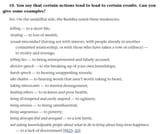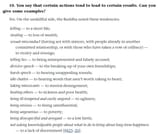1. What is kamma?
>intentional actions in thought, word, and deed
>the results of intentional actions—past or present—which are shaped by the quality of the intention behind those actions
2. How do actions determine results?
>Skillful intentional acts—those that would lead to no harm for yourself or anyone else—tend toward pleasant results.
>Unskillful intentional acts—those that would lead to harm for yourself or others, or both—tend toward painful results
Kamma is like a seed.
When you plant a bitter melon seed, it’ll tend to produce a bitter melon vine.
When you plant a grape seed, it’ll tend to produce a grape vine.
You can’t expect a grape seed to produce a bitter melon vine, or a bitter melon seed to produce a grape vine.
When you plant a “kamma seed,” it’ll tend to give pleasant results if it’s skillful, and painful results if it’s not.
Acts of generosity, over the long term, tend to lead to wealth.
Taking intoxicants tends to lead to mental derangement.
But how strong those results will be and how long they will take to ripen will depend on many factors in addition to the original actions:
the actions you’ve done before,
the actions you’ve done after,
and the state of your mind when the results are fully ripe.
How your mind acts around the ripening of old kamma seeds is the most important factor determining whether you suffer from those results.
If your present actions (new kamma) are unskillful as they engage with the results of old kamma, you can suffer even from the results of good past kamma.
If your present kamma is skillful, it can minimize the suffering that would come from bad past kamma.
If you treat the pleasure coming from past good kamma as an excuse for pride or selfishness, you’re going to suffer.
If you treat the pain coming from an unskillful action as an opportunity to comprehend pain so as to release yourself from its power, you’ll suffer less.
https://www.dhammatalks.org/books/KarmaQ&A/Section0004.html
4chan Search
5 results for "be0bce4ee631f6f7f34e27f6e240d0be"
>>937628187
dont be surprised when you get accused of random things
dont be surprised when you get accused of random things
>>936861394
let go of anger and relax
let go of anger and relax
>>936769069
And how is one made impure in four ways by verbal action?
There is the case where a certain person tells lies. When he has been called to a town meeting, a group meeting, a gathering of his relatives, his guild, or of the royalty [i.e., a royal court proceeding], if he is asked as a witness, ‘Come & tell, good man, what you know’: If he doesn’t know, he says, ‘I know.’ If he does know, he says, ‘I don’t know.’ If he hasn’t seen, he says, ‘I have seen.’ If he has seen, he says, ’I haven’t seen.’ Thus he consciously tells lies for his own sake, for the sake of another, or for the sake of a certain reward.
He engages in divisive speech. What he has heard here he tells there to break those people apart from these people here. What he has heard there he tells here to break these people apart from those people there. Thus breaking apart those who are united and stirring up strife between those who have broken apart, he loves factionalism, delights in factionalism, enjoys factionalism, speaks things that create factionalism.
He engages in harsh speech. He speaks words that are insolent, cutting, mean to others, reviling others, provoking anger and destroying concentration.
He engages in idle chatter. He speaks out of season, speaks what isn’t factual, what isn’t in accordance with the goal, the Dhamma, & the Vinaya, words that are not worth treasuring.
This is how one is made impure in four ways by verbal action.
And how is one made impure in four ways by verbal action?
There is the case where a certain person tells lies. When he has been called to a town meeting, a group meeting, a gathering of his relatives, his guild, or of the royalty [i.e., a royal court proceeding], if he is asked as a witness, ‘Come & tell, good man, what you know’: If he doesn’t know, he says, ‘I know.’ If he does know, he says, ‘I don’t know.’ If he hasn’t seen, he says, ‘I have seen.’ If he has seen, he says, ’I haven’t seen.’ Thus he consciously tells lies for his own sake, for the sake of another, or for the sake of a certain reward.
He engages in divisive speech. What he has heard here he tells there to break those people apart from these people here. What he has heard there he tells here to break these people apart from those people there. Thus breaking apart those who are united and stirring up strife between those who have broken apart, he loves factionalism, delights in factionalism, enjoys factionalism, speaks things that create factionalism.
He engages in harsh speech. He speaks words that are insolent, cutting, mean to others, reviling others, provoking anger and destroying concentration.
He engages in idle chatter. He speaks out of season, speaks what isn’t factual, what isn’t in accordance with the goal, the Dhamma, & the Vinaya, words that are not worth treasuring.
This is how one is made impure in four ways by verbal action.

